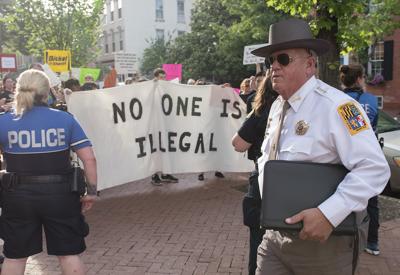Advertisement
Urban unrest has reshaped Sunday’s elections even in the most rural parts of the territory.
By Ilaria Maria Sala
Ms. Sala is a journalist based in Hong Kong.

HONG KONG — To reach Mui Wo, a small town on Lantau Island, you take a ferry from central Hong Kong, and after a 30-minute ride arrive at a small square with a car park and bus stops blackened by fumes. But just a minute’s walk away is a large, sandy beach overlooked by a tall mountain. As you make your way down the bicycle path, you might have to contend with feral cows and water buffaloes.
Bucolic Mui Wo is far from the chaos that has gripped the streets of urban Hong Kong for half a year, and yet here, too, everything feels forever changed. There are no demonstrations, riot police or tear gas. But the protests have left their mark on the village’s shaded paths, tranquil beaches and barbecue pits. In Mui Wo, as throughout the territory, entrenched political ways have bred resentment and frustration, and people now want more accountability.
Elections for Hong Kong’s 18 district councils are scheduled for Sunday — the first elections since mass protests began in June and the only elections in the territory that are entirely decided by direct suffrage. As you go up the ladder of power, direct representation diminishes: Only half of the Legislative Council is elected through universal suffrage; the other half is selected by various interest groups. Hong Kong’s leader, the chief executive, is chosen by an Election Committee of 1,200 people.
As of Friday afternoon, at least, the district council elections were still expected to take place. There had been doubts about that, especially given the extraordinarily violent confrontations between protesters and police in recent days — with their staggering number of tear gas canisters and Molotov cocktails, rubber bullets and live rounds, and even some arrows. Last week, the police attacked one university campus; after protesters occupied another campus, the police besieged it, trying to choke off their supplies and coerce them into submitting to arrest.
On Monday, Patrick Nip, the secretary for constitutional and mainland affairs, said the violence “reduced the chance of holding the elections” but that they would only be postponed if “absolutely necessary.” The week before, the People’s Daily, a mouthpiece of the Chinese Communist Party, had suggested that “putting down the riots” was a precondition for “fair elections.” Hong Kong’s highly unpopular leader, Carrie Lam, was, for her part, pledging that her government would do its “utmost to make sure the elections are held as scheduled.” Canceling the voting, one theory goes, would only incense protesters and perhaps also the public.
The government has put up around the city pale purple posters encouraging residents to participate on Sunday. “Show Your Care, Cast Your Vote,” the slogan says, above a photo of five smiling people, old and young, who hold out their hands in the shape of a heart. The message seems rather flat and out of touch, especially given the stakes.
District councilors are tasked with addressing livelihood issues — garbage collection, bus routes, their community’s daily needs — and only have limited resources to do so. But even though the job gives them minor influence over policy, it is useful training ground for fledgling politicians. And 121 district councilors sit on the Election Committee that selects the chief executive.
By the time the voter registration period ended in early July, in the midst of marches and demonstrations, nearly 390,000 residents had newly signed up to vote, with more than 17 percent of them said to be under 30. (There are now more than 4.1 million registered voters in total.) Many of the new candidates are young, too, and this year, all of the 452 district council seats will be contested. Freshly minted politicians hope to unseat the pro-government candidates who, thanks to established patronage networks and various special-interest groups, have long dominated local politics, especially in rural areas like Mui Wo.
Some of the newbie candidates are campaigning partly on the promise of change. Others on general demands for more democracy. Very few dare to endorse more controversial political issues and call for, say, self-determination or independence for Hong Kong. Joshua Wong, a poster boy for the 2014 Umbrella Movement, was the only candidate from the pro-democracy camp to be disqualified from running. But other candidates have been arrested recently or have been physically attacked. And in the past, the authorities have found ways to remove even members-elect from the Legislature.
In Mui Wo (population: 6,000), the electoral battle comes down to two main candidates: Randy Yu Hon-kwan, 57, the incumbent, who is pro-establishment, and Fung Siu-yin, 33, from Power for Democracy, who has been campaigning on a green platform, calling for a stop to development and for “sustainable island life.” Ms. Fung has also included the protesters’ “five demands” in her platform.
During the last district council elections in 2015, Mr. Yu was a steady presence at the ferry pier, promising residents more car parks, more schools and an overall better Mui Wo, in vague but self-assured terms. This year, he has kept a low profile. Ms. Fung, on the other hand, has been holding public discussions by the sea and her supporters cycle around the village holding up her campaign flags. Local Facebook groups usually rate new restaurants or advertise lost-and-found items, but these days they have been discussing Mr. Yu’s lack of responsiveness to community concerns and Ms. Fung’s potential merits.
The street protests that have convulsed Hong Kong are redefining the meaning of these elections throughout the territory: Calls for more representativeness and government accountability have become paramount even in the smallest and most rural communities.
Matthew Cheung, the chief secretary, recently said it wasn’t clear why people are so angry. Actually, it is. Hong Kongers want a greater say in how their home is run. After years of asking politely, their patience is running thin. Since Britain handed Hong Kong over to China in 1997, the Hong Kong government has continued to rule along colonial lines, with an elite minority running the place as if it knew best while flouting the people’s needs and demands.
In 2006, the government demolished the iconic Star Ferry pier and the adjoining Queen Pier, ignoring the most passionate objections. It has built the massive Hong Kong-Zhuhai-Macau Bridge (which nearly exterminated the local population of pink dolphins) and a high-speed rail connection with mainland China (which destroyed old rural communities in northern Hong Kong). Ms. Lam’s pet project is the very unpopular Lantau Tomorrow Vision, a gigantic development plan to connect and expand two islands in front of Lantau and house up to one million people. (Estimated cost: 624 billion Hong Kong dollars, nearly $80 billion.) Ms. Fung vocally opposes the project; Mr. Yu tries not to mention it.
In rural areas like Lantau, local politics are poisoned by various forms of patronage. Under the controversial Small House Policy, the government gives out land for free to male villagers who can show that their families have resided locally for a century or more — this, while so many Hong Kongers struggle under astronomical real-estate prices. A proposal to curb that policy in September set off the Heung Yee Kuk, an official rural interest group: It threatened to retaliate by blocking all government projects throughout the vast New Territories area. There is also the Signature Projects Scheme for community initiatives: In Mui Wo, some 10 million Hong Kong dollars (nearly $1.3 million) were spent to build a deck for viewing a dragon-boat race that is held once a year.
Some observers are calling Sunday’s elections a “referendum” on the government and the pro-democracy movement. Whatever the outcome, though, the mobilization of both voters and candidates so far is evidence enough that the people of Hong Kong want more, and better, representation.
Ilaria Maria Sala (@IlariaMariaSala) is an Italian journalist and writer based in Hong Kong.
The Times is committed to publishing a diversity of letters to the editor. We’d like to hear what you think about this or any of our articles. Here are some tips. And here’s our email: letters@nytimes.com.
Follow The New York Times Opinion section on Facebook, Twitter (@NYTopinion) and Instagram.


